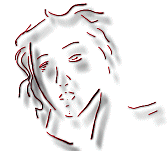
![]() BzWoman.com
We
Collect the Best for You ©
BzWoman.com
We
Collect the Best for You ©
Home - AskJenna - Books - Career /Business - Financial Matters - Health/Fitness - Herbal Medicine - Horoscope - Marriage/Family - Motivational - Solutions - Wisdom - email
Premenstrual Syndrome
DEFINITION
PMS consists of various physical and/or emotional symptoms that occur in the second half of the menstrual cycle, after ovulation. It is characterized by premenstrual discomfort in the lower abdomen and back, and in the breasts. All these features precede the period by a week or ten days. Fortunately, a woman obtains relief when her menstrual period begins. Another feature of PMS is a symptom-free time for several days every month, in the first half of the menstrual cycle.
Features: these include physical features like acne, backache, bloating, sore breasts, and headache. Emotional symptoms might include changes in sexual desire, difficulty concentrating, irritability.
Women may gain up to a kg. of weight or more in the latter part of the menstrual cycle due to water retention in the body. Emotional stress often contributes to the symptoms.
The only saving grace in this problem is that few women experience all these symptoms! Most have a few that recur each month.
The symptoms of certain medical conditions can resemble PMS. These conditions include allergies, depression, diabetes, dysmenorrhea (painful periods), endometriosis, fibrocystic breast disease, and thyroid problems.
CAUSES
There's still some disagreement about what causes PMS, but it definitely seems to be linked to hormones. A relative lack of the hormone progesterone is suspected along with increase in a water retaining substance called anti diuretic hormone. Not getting enough vitamins and minerals is another cause of PMS.
TREATMENT
The assessment of the emotional and work related stress is very important. Many women find
that a balanced diet and healthy snacks are helpful, as are avoiding caffeine and reducing
salt intake. Simple reassurance often does wonders, but often it is necessary to treat the
symptoms with various drugs
Diuretics ("water pills") can reduce bloating
Analgesics like ibuprofen, aspirin ease headache or cramps
Combined oral contraceptives also called the birth control pill may be useful for some
women.
Evening primrose oil (gamma linolenic acid) is also used widely these days.
Home - AskJenna - Books - Career /Business - Financial Matters - Health/Fitness - Herbal Medicine - Horoscope - Marriage/Family - Motivational - Solutions - Wisdom - email